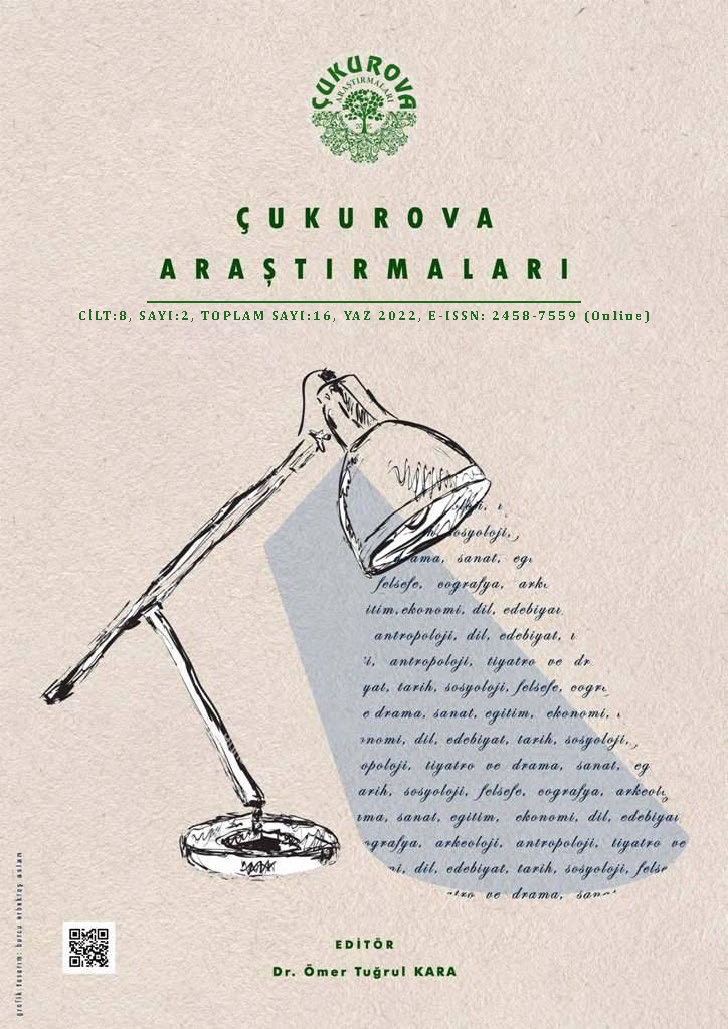Author :
Abstract
Bilişsel Şiirbilim alanı yazınsal çalışmaların bilişsel bilimler çerçevesinde özellikle de Bilişsel Psikoloji alanının katkısıyla içerdiği duygu yoğunluğu bakımından diğer türlerden farklılık gösteren şiirlerin dil yoluyla okuyuculara ulaşma biçimlerini incelemektedir. Bilişsel Şiirbilim çalışmaları her ne kadar Tsur (1992) tarafından okuyucu üzerindeki algısal etkilerin Bilişsel Psikoloji temelinde açıklanmasını ifade etse de, sonrasında alana ait çalışmalar Lakoff ve Johnson’ın (1980) Kavramsal Eğretileme Kuramı (Conceptual Metaphor Theory) ile Stockwell’in (2002) bilişsel dilbilim, bilişsel biçembilim ve Metin Dünyası Kuramı (Text World Theory) birlikteliğiyle oluşturduğu yaklaşımı içermektedir. Yeni bir çalışma alanı olarak şiirsel dilin ve biçimin bireye ait bilişsel süreçler yoluyla nasıl sınırlandırıldığını ve biçimlendirildiğini açıklamaya çalışan Tsur (1992, 2002) çerçevesinde yapılan bu çalışmada şiir yoluyla tetiklenen duygu etkileri ve sıklıklarını çözümlemek, bu etkiler ve sıkılıklarında tekçil-bütüncül ilişki açısından benzerlik/farklılık olup olmadığını belirlemek, elde edilen veriler doğrultusunda bilişsel bir işlemleme türü olarak duygu etkilerini Bilişsel Şiirbilim çerçevesinde tartışmak amaçlanmıştır. Bu amacı gerçekleştirmek için Nazım Hikmet Ran’ın Güz adlı şiiri veritabanı olarak seçilmiş, Plutchik (1980)’in Duygu Modeli temel alınarak 407 Türkçe anadili konuşucusu katılımcı üzerinde şiirdeki duygu tetikleyicisi olarak işlev gören düzeneğin tekçil dizeler mi yoksa bütüncül algılanış mı olduğu bilişsel bakış açısıyla sentezlenerek tartışılmış, şiirdeki duygu etkilerinin tekçil ve bütüncül açıdan bakışımsız bir ilişki içinde oldukları sonucuna ulaşılmıştır.
Keywords
Abstract
Cognitive poetics examines how poems reach readers through language with the contribution of literary studies within the framework of cognitive sciences, especially the field of Cognitive Psychology. Although the studies on Cognitive Poetics by Tsur (1992) explain the perceptual effects on readers based on Cognitive Psychology, later studies in this field also include the Lakoff and Johnson’s (1980) Conceptual Metaphor Theory and the approach by Stockwell (2002), which is formed by cognitive linguistics, cognitive stylistics and Text World Theory. In this study, which was carried out within the framework of Tsur (1992, 2002), trying to explain how poetic language and form are restricted and shaped through cognitive processes, the aim is to analyze the emotional effects and frequencies triggered by poetry and to determine whether there are similarities/differences in terms of particularity and holistic in the effects, and to discuss the effects of emotion as a type of cognitive processing within the framework of Cognitive Poetics. To realize this purpose, the poem Güz by Nazım Hikmet Ran has been chosen as the database and discussed whether the emotional triggers in poetry are perceived by singular lines or as a whole based on Plutchik’s (1980) Emotion Wheel on 407 Turkish native speakers. As a result of the study, it has been found that the emotional effects in poetry are in an asymmetric partial-holistic relationship.
Keywords
- Agiş, F. D. (2017). Lina Kohen Alburek’in “Hanuka” şiirine bilişsel şiirbilimsel bir yaklaşım. Söylem Filoloji Dergisi, 2(3), 75-85.
- Brone, G. and Vandaele, J. (2009). Application of cognitive linguistics cognitive poetics: goals, gains and gaps. Berlin-New-York: Mouton de Gruyter.
- Büyükkantarcıoğlu, S. N. (2016). Metinden zihinlere yolculuk: Bilişsel dilbilim ve bilişsel şiirbilim bağlamında deneysel bir çalışma. S. Büyükkantarcıoğlu, I. Özyıldırım ve E. Yarar (Ed.), Prof. Dr. Ahmet Kocaman’a armağan: dilbilime adanmış bir yaşam, (ss.111-128). Ankara: Hacettepe Üniversitesi Yayınları.
- Freeman, M. H. (2007). Cognitive linguistic approaches to literary studies: state of the art in cognitive poetics. D. Geeraerts & H. Cuyckens (Ed.), The Oxford handbook of cognitive linguistics, (ss.11751202). New York: Oxford University Press.
- Gavins, J. and Steen, G. (Ed.) (2003). Cognitive poetics in practice. Londra: Routledge.
- Groome, D. (1999). An introduction to cognitive psychology: processes and disorders. East Sussex: Psychology Press.
- Johnson-Laird, P. N. and Oatley, K. (2008). Emotions, music and literature. Lewis, M., Haviland-Jones, J. M., Feldman Barrett, L. (Ed.), Handbook of emotions, (3. Baskı). ed, (ss. 102–113). New York: Guilford Press
- Lakoff, G. and Johnson M. (1980). Metaphors we live by. Chicago: The University of Chicago Press.
- Lilja, E. (2014). Reuven Tsur Poetic Rhythm. Structure and performance. An empirical study in cognitive poetics. (2. Baskı) Brighton, Sussex Academic Press, 2012. Locke, J. (2021). Anlama yetisinin yönetimi üzerine. Ankara: Fol Kitap Plutchik, R. (1980). Emotion: A psychoevolutionary synthesis. New York: Harper and Row.
- Scheaffer, R. L., Mendenhall, III. W., Ott, R. L. and Gerow, K. G. (2011). Elementary survey sampling. (7. Baskı). Boston, MA: Cengage Learning.
- Stockwell, P. (2002). Cognitive poetics. New York: Routledge.
- Stockwell, P. and Whiteley, S. (2014). The Cambridge handbook of stylistics (Cambridge handbooks in language and linguistics). Cambridge: Cambridge University Press.
- Tsur, R. (1992). Toward a theory of cognitive poetics. Amsterdam: Elsevier Science Publishers.
- Tsur, R. (1998). Poetic rhythm: structure and performance-an empirical study in cognitive poetics. Bern: Peter Lang.
- Tsur, R. (2002). Aspects of cognitive poetics. E. Semino ve J. Culpeper (Ed.), Cognitive stylistics: language and cognition in text analysis, (ss. 279-318). Amsterdam/Philadelphia: John Benjamins Publishing Company.
- Tsur, R. (2003). On the shore of nothingness: A study in cognitive poetics. Exeter, U.K: Imprint Academic.
- Tsur, R. (2006). Kubla Khan – Poetic structure, hypnotic quality and cognitive Style: a study in mental, vocal and critical performance. Amsterdam: John Benjamins.
- Tsur, R. (2008). Toward A theory of cognitive poetics. Brighton: Sussex Academic Press.
- Tsur, R. (2012). Playing by ear and the tip of the tongue: Precategorial information in poetry. Amsterdam: John Benjamins.
- Tsur, R. (2017). Poetic conventions as cognitive fossils. New York: Oxford University Press.
- West, D. (2012). I. A. Richards and the rise of cognitive stylistics. Bloomsbury Academic





